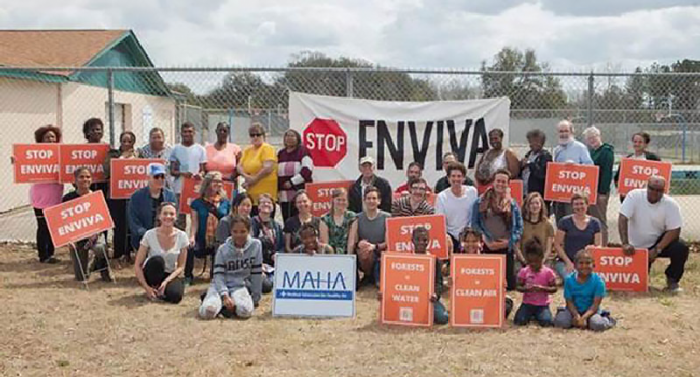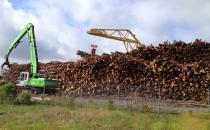Legal challenge forces NC wood pellet facility to install pollution controls
Updated January 2022—
In December, Enviva completed construction and commenced operation of the new pollution control equipment required by SELC’s settlement at its Hamlet location. SELC represented CleanAIRE NC jointly with Environmental Integrity Project, which settled in 2019.
The only duty remaining under the settlement agreement is for Enviva to provide its semi-annual reports to CleanAIRE NC through this summer. Reports are due to DEQ going forward under the terms of Enviva’s current air quality permit.
If the facility had commenced operations under its original permit—issued in 2016—it would’ve been one of the largest sources of volatile organic compounds, or VOCs, and acrolein in North Carolina. Controls the settlement required will significantly reduce these emissions and bump it out of those top spots for VOCs and hazardous air pollution.
“Hamlet and Richmond County communities surrounding the plant are able to breathe easier knowing the state is monitoring their air quality,” says Attorney Heather Hillaker. “But it’s important to remember that even with these new controls, this is still a polluting facility.”
Pellet manufacturing at Enviva Hamlet alone accounts for approximately 266,000 tons of heat-trapping pollution per year, and that totals over 1.4 million tons including emissions from burning the pellets.
With this in mind, SELC is continuing its work to cut carbon—not our forests—by stopping biomass.
Read the story as previously reported below.
The world’s largest manufacturer of wood pellet fuel for power plants, Enviva, agreed to install equipment to cut air pollution at a biomass plant under construction in Richmond County, North Carolina. The agreement was part of a settlement finalized today after three conservation groups challenged the plant’s state air permit.
At a unit of its wood pellet plant being built in the town of Hamlet, east of Charlotte, Enviva will reduce harmful volatile organic compounds (or VOC) air pollution from its smokestacks by at least 95 percent, according to an agreement the company signed with Clean Air Carolina, which is represented by the Environmental Integrity Project and SELC. The N.C. Department of Environmental Quality (DEQ) also signed onto the agreement.
“The residents of Hamlet and Richmond County deserve protection from the unnecessary air pollution that would’ve come with Enviva’s facility if not for this agreement,” said Heather Hillaker, attorney with SELC. “Now Richmond County families can breathe easier, but, as the wood pellet industry plans to expand operations throughout the state, the threat remains for many North Carolinians to the air we breathe and wetlands that buffer us from storms and floods.”
“Residents of Richmond County already face some of the worst health outcomes in our state,” said June Blotnick, Executive Director of Clean Air Carolina. “The new air pollution controls required by this settlement will decrease hazardous air pollutants and VOC emissions, reducing two additional threats to the communities’ health.”
On behalf of Clean Air Carolina, EIP and SELC on February 13 challenged the Enviva Hamlet air pollution permit in the North Carolina Office of Administrative Hearings. The case alleges that DEQ failed to scrutinize Enviva’s air pollution estimates and improperly classified the facility as a “minor” air pollution source when it was actually a major source.
Under the terms of the settlement agreement, Enviva will install one of several pollution control technologies on a wood pellet production unit known as a “dry hammermill” at the Hamlet plant. Although the exact control technology will be selected by Enviva in the coming months, each of the available options will achieve at least 95 percent reduction in volatile organic compound (VOCs) pollution and hazardous air pollutants like methanol, acrolein, and formaldehyde.
VOCs are a potent precursor to ground level ozone and smog, and can cause breathing problems for the elderly, young children, and people with lung conditions such as asthma. The new controls will reduce the facility’s VOC emissions by at least 140 tons per year, and potentially by as much as 500 tons per year, according to the terms of the agreement.
The Enviva plant is part of a new and growing industry expanding across North Carolina and the South, with 21 plants – 15 of them built in the last decade – that clear cut forests and compact wood into pellets to ship overseas to Europe, where they are burnt in power plants. The demand is driven by a European climate change policy that incorrectly treats wood biomass pollution as harmless or “carbon neutral.” Numerous studies debunk this myth and show the industry actually puts as much or more carbon pollution into the air than the fuels it replaces.

Members of the community around Enviva’s new wood pellet-processing plant protested the air pollution the facility would bring if built as initially approved. (@Dogwood Alliance)

